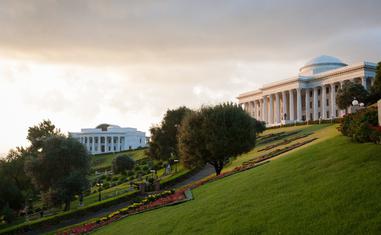The Bahá’í Faith, a relatively contemporary religious tradition, heralds a nuanced vision of democracy that profoundly diverges from conventional paradigms. At the heart of this discourse lies a pivotal inquiry: Can true democracy exist within a framework predicated not merely on majority rule, but rather on a higher moral foundation? This exposition embarks on the exploration of Bahá’í teachings regarding democracy, advancing the premise that the Faith not only advocates for a democratic structure but envisions a transformative global shift towards a more equitable and inclusive political reality.
To understand the Bahá’í approach to democracy, it is essential to grasp the concept of unity in diversity. The Bahá’í Faith postulates that humanity is a single, interdependent entity, wherein the diversity of race, culture, and ethnicity should be a source of strength rather than contention. This principle lays the groundwork for a democratic ideal that transcends the limitations of conventional nationalistic frameworks, advocating for a global governance system that embraces all individuals. Such a vision poses a challenge: how do we reconcile the plethora of unique cultural identities with the necessity for a unified global governance?
Central to Bahá’í teachings is the assertion that democracy is not merely a system of government, but rather an extension of divine will. Abdu’l-Bahá, a key figure within the Faith, articulated that true democracy necessitates the ethical development of individuals and societies. He posited that for democracy to flourish, individuals must cultivate virtues such as trustworthiness, honesty, and selflessness. Thus, an intriguing premise emerges: Is it sufficient to have a democratic voting mechanism if the electorate lacks the requisite moral compass to make informed and ethical decisions?
Furthermore, Bahá’í perspectives on democracy underscore the importance of consultation as a mechanism for governance. This deliberative process not only welcomes diverse viewpoints but also seeks consensus, aligning with the Faith’s overarching principle of unity. However, this introduces another inquiry: in a world increasingly polarized by discordant ideologies, how can authentic consultation be achieved in practical terms? The Bahá’í Faith offers guidance by encouraging respectful discourse, emphasizing the need for humility and detachment from personal biases during discussions.
The Bahá’í approach to democracy also encompasses the elevation of women. The Faith unequivocally affirms that gender equality is essential to the establishment of true democracy. Bahá’u’lláh, the founder of the Faith, proclaimed that “the earth is but one country and mankind its citizens.” In this context, the empowerment of women emerges as paramount; their full participation in governance is not only a matter of justice but a requisite for societal advancement. Yet, this also poses a challenge—how can entrenched patriarchal structures be dismantled in various societies to allow for the flourishing of gender equality?
Moreover, the Bahá’í teachings assert that the principles of justice and equity must underpin democratic practices. The Faith emphasizes that governments should prioritize the welfare of all citizens, seeking to eradicate poverty and ensure the equitable distribution of resources. This principle invites further scrutiny: how can policymakers effectively balance individual freedoms with the imperative to provide for the common good? The teachings inspire a reevaluation of current socio-economic models, advocating for systems that reflect ethical obligations to the less fortunate and marginalized.
In addition, the Bahá’í Faith envisions a new world order where religion and government coexist harmoniously. This innovative paradigm challenges the secularization that often characterizes modern governance, where spiritual principles are relegated to the private sphere. Instead, the Faith posits that a spiritually infused governmental framework can lead to more just and moral policies. This raises profound questions: Can secular states integrate spiritual ethos into their moral framework, and to what extent would such an integration bolster democratic ideals?
Throughout its teachings, the Bahá’í Faith advocates for the establishment of global governance structures that align with its principles of justice, equity, and unity. The proposition of a world parliament, for instance, seeks to address global issues collaboratively, thereby negating the often-fractious nature of international relations. This notion, while progressive, poses its own hurdles. The question then arises: how can nations with disparate interests and historical grievances come together to form a cohesive global governing body?
In conclusion, the Bahá’í Faith not only espouses a vision of democracy that addresses the intricate realities of an interconnected world but also calls for profound personal and social transformations. It presents a formidable challenge: true democracy is not merely the exercise of votes but hinges on the moral upliftment of individuals and the commitment to collective welfare. As we navigate the complexities of contemporary political landscapes, the Bahá’í teachings offer a valuable framework for reimagining democratic principles in a way that embraces the harmonious coexistence of humanity. The arduous journey towards true democracy may be fraught with obstacles, yet the potential for a richer, more inclusive global society urges continual exploration of these transformative teachings.
